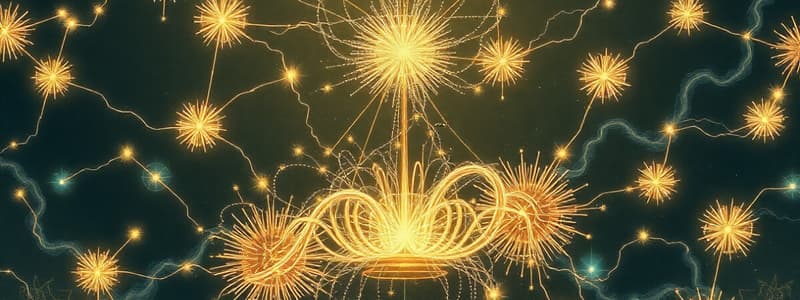Podcast
Questions and Answers
What is an electric circuit primarily composed of?
What is an electric circuit primarily composed of?
- Electrical elements (correct)
- Different forms of energy
- Natural resources
- Chemical compounds
According to the law of conservation of energy, what happens to energy in a closed system?
According to the law of conservation of energy, what happens to energy in a closed system?
- Energy becomes less useful but increases overall
- Energy is created from the surroundings
- Energy is destroyed over time
- Energy remains constant despite transformation (correct)
Which of the following is an example of kinetic energy?
Which of the following is an example of kinetic energy?
- Energy stored in gasoline
- Energy within a compressed spring
- Moving water in a river (correct)
- The energy stored in food
What is the SI unit for measuring energy?
What is the SI unit for measuring energy?
What cannot occur according to the law of conservation of energy?
What cannot occur according to the law of conservation of energy?
Which type of energy is particularly associated with electromagnetic waves?
Which type of energy is particularly associated with electromagnetic waves?
What does the term 'consumed' energy imply?
What does the term 'consumed' energy imply?
Which of these is NOT a form of kinetic energy?
Which of these is NOT a form of kinetic energy?
What is the charge of an electron compared to a proton?
What is the charge of an electron compared to a proton?
What happens to the energy of an electron as it moves farther from the nucleus?
What happens to the energy of an electron as it moves farther from the nucleus?
What is the result of an atom losing electrons?
What is the result of an atom losing electrons?
What are ions?
What are ions?
How does ionization typically occur?
How does ionization typically occur?
Which statement is true about anions?
Which statement is true about anions?
Which factor does NOT contribute to ionization?
Which factor does NOT contribute to ionization?
What is true about the charge of a single electron?
What is true about the charge of a single electron?
What type of energy is produced when atoms and molecules collide due to a rise in temperature?
What type of energy is produced when atoms and molecules collide due to a rise in temperature?
Which type of energy is specifically associated with the mechanical movement of objects?
Which type of energy is specifically associated with the mechanical movement of objects?
How is electrical energy generated?
How is electrical energy generated?
What type of energy is defined as the energy stored due to an object's height?
What type of energy is defined as the energy stored due to an object's height?
Which of the following best describes elastic potential energy?
Which of the following best describes elastic potential energy?
What is an example of stored chemical energy?
What is an example of stored chemical energy?
What energy transformation occurs when a person rides a bicycle down a steep hill?
What energy transformation occurs when a person rides a bicycle down a steep hill?
Which type of energy is associated with the vibrations of objects producing sound?
Which type of energy is associated with the vibrations of objects producing sound?
What type of energy is released when wood burns?
What type of energy is released when wood burns?
What is matter primarily composed of?
What is matter primarily composed of?
What defines the identity of an element at the atomic level?
What defines the identity of an element at the atomic level?
Which of the following statements about protons and neutrons is correct?
Which of the following statements about protons and neutrons is correct?
What is released when nuclei are split apart in nuclear reactions?
What is released when nuclei are split apart in nuclear reactions?
What happens to wood when it burns?
What happens to wood when it burns?
What distinguishes the different elements in the periodic table?
What distinguishes the different elements in the periodic table?
Which of the following gases supports combustion more effectively?
Which of the following gases supports combustion more effectively?
What property defines how well a material can allow electric current to pass through it?
What property defines how well a material can allow electric current to pass through it?
Which of the following best describes conductors?
Which of the following best describes conductors?
How do electrons behave in a conductor?
How do electrons behave in a conductor?
What happens to charge when it is transferred to a conducting object at a specific location?
What happens to charge when it is transferred to a conducting object at a specific location?
What characteristic of conductors allows them to have a high conductance?
What characteristic of conductors allows them to have a high conductance?
In terms of charge interaction, what do the rules of 'opposites attract and likes repel' imply for conductors?
In terms of charge interaction, what do the rules of 'opposites attract and likes repel' imply for conductors?
Which of the following statements about electric resistivity is true?
Which of the following statements about electric resistivity is true?
What does high resistance in a material typically indicate?
What does high resistance in a material typically indicate?
What allows excess electrons to distribute themselves throughout the surface of a conductor?
What allows excess electrons to distribute themselves throughout the surface of a conductor?
Which material is considered the best conductor at room temperature?
Which material is considered the best conductor at room temperature?
What primarily contributes to the ability of conductors to transfer charge?
What primarily contributes to the ability of conductors to transfer charge?
Why are gases generally poor conductors of electricity?
Why are gases generally poor conductors of electricity?
What is a key characteristic of good conductors in terms of their atomic structure?
What is a key characteristic of good conductors in terms of their atomic structure?
What is the effect of touching a charged conductor to another object?
What is the effect of touching a charged conductor to another object?
What type of material can change its conductivity when impurities are added?
What type of material can change its conductivity when impurities are added?
Why might humans experience electric shocks?
Why might humans experience electric shocks?
Flashcards
Energy
Energy
The ability to do work or make objects move.
Electrical Circuit
Electrical Circuit
An interconnection of electrical elements for transferring energy.
Law of Conservation of Energy
Law of Conservation of Energy
In a closed system, total energy is conserved, even if transformed.
Kinetic Energy
Kinetic Energy
Signup and view all the flashcards
Radiant Energy
Radiant Energy
Signup and view all the flashcards
Electrical Conductivity
Electrical Conductivity
Signup and view all the flashcards
Element (in circuit)
Element (in circuit)
Signup and view all the flashcards
Joule
Joule
Signup and view all the flashcards
Thermal Energy
Thermal Energy
Signup and view all the flashcards
Mechanical Energy
Mechanical Energy
Signup and view all the flashcards
Electrical Energy
Electrical Energy
Signup and view all the flashcards
Sound Energy
Sound Energy
Signup and view all the flashcards
Gravitational Energy
Gravitational Energy
Signup and view all the flashcards
Elastic Energy
Elastic Energy
Signup and view all the flashcards
Chemical Energy
Chemical Energy
Signup and view all the flashcards
Potential Energy
Potential Energy
Signup and view all the flashcards
Chemical Energy
Chemical Energy
Signup and view all the flashcards
Nuclear Energy
Nuclear Energy
Signup and view all the flashcards
Matter
Matter
Signup and view all the flashcards
Atoms
Atoms
Signup and view all the flashcards
Element
Element
Signup and view all the flashcards
Proton
Proton
Signup and view all the flashcards
Neutron
Neutron
Signup and view all the flashcards
Atomic Nucleus
Atomic Nucleus
Signup and view all the flashcards
Electron
Electron
Signup and view all the flashcards
Electron Shell
Electron Shell
Signup and view all the flashcards
Ion
Ion
Signup and view all the flashcards
Cation
Cation
Signup and view all the flashcards
Anion
Anion
Signup and view all the flashcards
Ionization
Ionization
Signup and view all the flashcards
Electron Movement
Electron Movement
Signup and view all the flashcards
Atomic charge unit
Atomic charge unit
Signup and view all the flashcards
Electric Conductivity
Electric Conductivity
Signup and view all the flashcards
Conductor
Conductor
Signup and view all the flashcards
Loosely Bound Electrons
Loosely Bound Electrons
Signup and view all the flashcards
Electron Movement (Conductor)
Electron Movement (Conductor)
Signup and view all the flashcards
High Conductance
High Conductance
Signup and view all the flashcards
Low Resistance
Low Resistance
Signup and view all the flashcards
Charge Distribution (Conductor)
Charge Distribution (Conductor)
Signup and view all the flashcards
Electrical Conductor
Electrical Conductor
Signup and view all the flashcards
Electrical Conductor
Electrical Conductor
Signup and view all the flashcards
Valence Electron
Valence Electron
Signup and view all the flashcards
Charge Distribution in Conductors
Charge Distribution in Conductors
Signup and view all the flashcards
Charge Transfer
Charge Transfer
Signup and view all the flashcards
Electrical Shock
Electrical Shock
Signup and view all the flashcards
Conductor Examples
Conductor Examples
Signup and view all the flashcards
Poor Electrical Conductor
Poor Electrical Conductor
Signup and view all the flashcards
Resistor
Resistor
Signup and view all the flashcards
Study Notes
Electrical Conductivity
- Electricity is the transfer of energy from one point to another
- A circuit is an interconnection of components
- Energy is the ability to do work and make objects move
- Different forms of energy exist, including chemical energy (in fuels like gasoline)
- Energy cannot be created or destroyed, only transformed from one form to another
- The SI unit of energy is the Joule
- Energy is broadly categorized into kinetic energy and potential energy
Kinetic Energy
- Kinetic energy is associated with an object's motion
- Radiant energy is a type of kinetic energy found in electromagnetic waves (visible light, ultraviolet, infrared, gamma, and radio waves)
- Thermal energy (heat) comes from the movement of atoms and molecules in a substance
- Mechanical energy is associated with movement of objects
- Electrical energy is the flow of negatively charged electrons around a circuit
- Sound energy is produced when a force causes an object or substance to vibrate
Potential Energy
- Potential energy is stored energy in an object or system
- Gravitational energy is stored in an object due to its height
- Elastic energy is stored when an elastic object is deformed
- Chemical energy is stored in chemical compounds
- Nuclear energy is stored in the nucleus of an atom
Matter
- Matter is anything that has mass and takes up space
- The basic building blocks of matter are atoms
- Atoms consist of protons, neutrons, and electrons
- Protons are positively charged, neutrons are neutral, and electrons are negatively charged
Conductors
- Conductors allow electricity to flow easily through them
- Conductors have loosely bound electrons that can move from atom to atom
- Common conductors include copper and aluminum
- Metals are generally good conductors
Insulators
- Insulators resist the flow of electricity
- Insulators usually have tightly bound electrons that cannot move easily
- Common insulators include glass, porcelain, rubber, and various plastics
- Insulators are used to prevent short circuits
Semiconductors
- Semiconductors have conductivity between conductors and insulators
- Semiconductors can be compounds or pure elements (like silicon or germanium)
- Impurities in semiconductors can be added to change their conductivity
- Semiconductors are used in various electronic devices (diodes, transistors, integrated circuits)
Studying That Suits You
Use AI to generate personalized quizzes and flashcards to suit your learning preferences.




